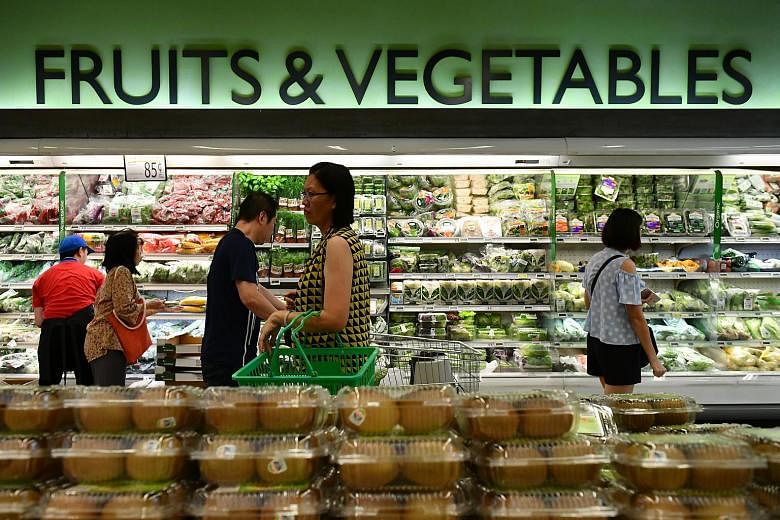SINGAPORE - A guidebook to cut food waste at supermarkets was launched on Friday (Oct 13) by the National Environment Agency (NEA).
The guidebook provides a step-by-step guide on how supermarket operators can develop food-waste minimisation plans, and the cost savings that they can reap as a result of putting them in place.
Tips listed include setting up proper storage conditions to prevent spoilage and the redistribution of unsold food.
Non-domestic sources, including supermarkets, food retail outlets and food manufacturers, account for about half of the food waste generated in Singapore.
The NEA noted that some supermarkets are already doing their part to cut wastage.
For instance, the Dairy Farm supermarket chain has set up marked-down sections at its outlets, selling food products that are approaching their expiry dates at lower prices.
NTUC FairPrice does the same with blemished fruits and vegetables, and seafood and chilled meats that have been on display for a day. This has helped it cut the amount of food waste it produces per sq m of retail space from 11.6kg in 2014 to 6.3kg in 2016.
Meanwhile, Sheng Siong tracks its food waste at its central distribution centre, where food waste is separated from general waste, and the tonnage sent for disposal is recorded.
Senior Minister of State for the Environment and Water Resources Amy Khor said the guide will help supermarkets do even more.
On Friday, Dr Khor also lauded the waste-cutting efforts of five shopping mall operators and a retail tenant at the inaugural 3R Awards for Shopping Malls.
The award winners were malls 313@Somerset, Ikea Alexandra, Jem, Parkway Parade and The Shoppes at Marina Bay Sands, and beauty products retailer Kiehl's Singapore.
Ikea Singapore was the first retail mall chain operator in Singapore to stop providing disposable shopping bags; it encourages its customers to buy reusable bags instead. In March 2016, it also started replacing disposable containers for takeaway meals with reusable ones.
Meanwhile, Jem has installed eco-digesters which convert two tonnes of organic waste into water each day. Parkway Parade has such digesters that convert 1.4 tonnes of organic waste into water each day. Festive decorations are also reused on other occasions.
Ms Ng Hsueh Ling, managing director for Singapore at Lendlease, which manages 313@Somerset, Jem and Parkway Parade, said: "Sustainability is a key guiding principle here at Lendlease, so each mall's business plan has to include environmental targets and an action plan with key sustainability initiatives to undertake."
In 2016, large shopping malls of more than 50,000 sq ft of area that can be leased out collectively disposed of 225,000 tonnes of waste. This is 7 per cent of the total waste disposed of here.
But while more than 90 per cent of these malls have waste reduction plans in place, the average recycling rate was less than 10 per cent in 2016.
"Clearly, shopping malls need to step up their waste minimisation efforts," Dr Khor said.
"I call on more operators to join this national effort towards becoming a Zero Waste Nation," she added.

